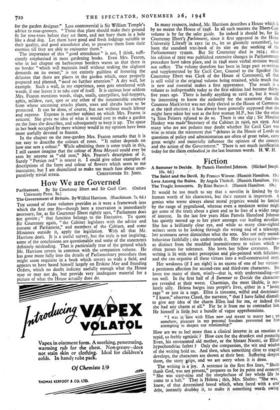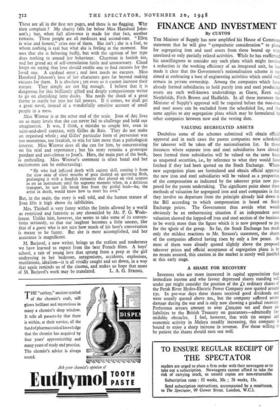Fiction
IT would be too much to say that a novelist is limited by the human worth of his characters, but their stature is important. A genius who wrote always about moral pygmies would be limited by the range of pygnaihood, whereas even a mediocre writer might get some of the truth about a giant and so be free of a wider range of interest. In the last few years Miss Pamela Hansford Johnson has quietly moved up to her place amongst our leading novelists. She has a brilliantly clear eye, and while so many clear-sighted writers seem to be looking through the wrong end of a telescope, her acuteness never diminishes what she sees. She not only records behaviour faithfully ; she understands it. Her tolerance is creative— as distinct from the muddled insensitiveness to values which so often passes for tolerance. She loves her fellow creatures. Her writing is lit with exact perception and pin-pointed with felicities; and she can organise all these virtues into a well-constructed story.
Her weakness (if I am right) is an excess of one of her virtues: a persistent affection for second-rate and third-rate characters. She loves too many of them, wisely—that is, with understanding—ye: too well. In the first half of A Summer to Decide the characters are revealed at their worst. Charmian, the most likable, is reso- lutely silly. Helena barges into people's lives, either in a "loving rage" or just in a rage. Ellen is tiresome, wilful and doctrinaire "I know," observes Claud, the narrator' "that I have failed dismally to give any idea of the charm Ellen had for me, or indeed that she had any charm at all." Far be it from me to contradict him He himself is little but a bundle of vague apprehensions.
"I was in 'love with Ellen now and meant to marry her ; yet somehow, pleasure in my personal freedom prevented me hoz attempting to deepen our relationship."
How are we to feel more than a clinical interest in an emotion se tepid, so feebly egotistic ? How care for the drunken and posturing Evan, his envenomed old mother, or the blatant Naomi, or Ellen': hypochondriac father ? Only the compassion the wit and wisdon of the writing hold us. And then, when something close to traged] develops the characters are shown at their best. Suffering deepen them, the story grips, and we are sorry when it is done.
The writing is a joy. A sentence in the first five lines " Sholtr thank God, was not present," prepares us for its point and econom} "She was sixty-nine and the steeplechase of her whole life ha. come to a halt." That is Helena ; this, Mrs. Sholto: "She was, knew, of that determined breed which, when faced with a smal debt, instantly double it, to make it something worth owing.
These are all in the first ten pages, and there is no flagging. Why then complain ? My charity falls far below Miss Hansford John- son's ; but, when full allowance is made for that fact, another remains. These people are all mediocre and second-rate. "Ellen is wise and honest," cries one of them. She isn't ; she is a fool, to whom nothing is real but what she is feeling at the moment. She sees that she is behaving badly, but with the egotism of her type does nothing to amend her behaviour. Charmian is foolish too, and her grand act of self-immolation futile and 'unnecessary. Claud keeps on saying that love should enable one to find excuses for the loved one. A cardinal error ; real love needs no excuses. Miss Hansford Johnson's love of her characters goes far beyond making excuses for them. It is absolute ; yet even so it cannot increase their stature. They simply are not big enough. I believe that it is dangerous for this brilliantly gifted and deeply compassionate writer to go on cherishing lame ducks. She needs the shock of a great theme to startle her into her full powers. If it comes, we shall get a great novel, instead of a wonderfully sensitive account of small people in a mess.
Miss Winwar is at the other end of the scale. Joan of Arc lives on so many levels that she can never fail to challenge and hold our imagination. It was, I think, a mistake to couple her, even in saint-and-devil contrast, with Gilles de Rais. They do not make an organised whole ; and Gilles' particular form of perversion was too monstrous, too freakish, to win for him more than a pathological interest. Miss Winwar does all she can for him, by concentrating on his trial and repentance ; but his story remains a grotesque pendant and anti-climax to Joan's. Hers, the main part of the book, is enthralling. Miss Winwar's comment is often banal and her excitements can be embarrassing : "He who had inflicted death with sapient skill, coaxing it from the slow ooze of silent mouths of pain slashed on quivering flesh, prolonging it with a fiendish virtuosity that played on vital sources as on an instrument until the supreme moment when, in a delirious transport, he saw life break free from the pitiful husk—he, the artist in death, would know how to meet his own."
But, in the main, the story is well told, and the human stature of Joan lifts it high above its infelicities.
Mrs. Thirkell is very funny within the limits allowed by a world as restricted and fantastic as any chronicled by Mr. P. G. Wode- house. Unlike him, however, she seems to take some of its conven- tions seriously, so that our laughter becomes a little uneasy, like that of a guest who is not sure how much of his host's conversation is meant to be funny. But she is most accomplished, and her assurance is magnificent.
M. Barjavel, a new writer, brings us the realism and tenderness we have learned to expect from the best French films. A boys' school, a tale of young love that sprang from a peep at the girl undressing in her bedroom, antagonisms, accidents, explosions, mutilations, idealism—it is all vividly caught and set down, in a way that again reminds us of the cinema, and makes us hope that more of M. Barjavel's work may be translated. L. A. G. STRONG.





































 Previous page
Previous page